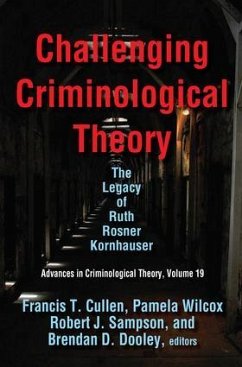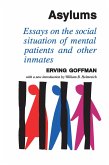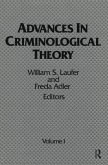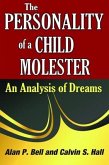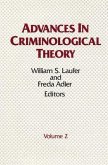Challenging Criminological Theory
The Legacy of Ruth Rosner Kornhauser
Herausgeber: Cullen, Francis T; Dooley, Brendan D; Samspon, Robert J; Wilcox, Pamela
Challenging Criminological Theory
The Legacy of Ruth Rosner Kornhauser
Herausgeber: Cullen, Francis T; Dooley, Brendan D; Samspon, Robert J; Wilcox, Pamela
- Gebundenes Buch
- Merkliste
- Auf die Merkliste
- Bewerten Bewerten
- Teilen
- Produkt teilen
- Produkterinnerung
- Produkterinnerung
This volume is divided into five sections that, when taken together, offer an informative account of the impact of Ruth Rosner Kornhauser's Social Sources of Delinquency on the development of American criminological thought. This classic book was her major contribution to the field.
Andere Kunden interessierten sich auch für
![Asylums Asylums]() Erving GoffmanAsylums173,99 €
Erving GoffmanAsylums173,99 €![Criminological Theory Criminological Theory]() Anthony WalshCriminological Theory97,99 €
Anthony WalshCriminological Theory97,99 €![Deinstitutionalising Women Deinstitutionalising Women]() Kelley JohnsonDeinstitutionalising Women44,99 €
Kelley JohnsonDeinstitutionalising Women44,99 €![Deinstitutionalising Women Deinstitutionalising Women]() Kelley JohnsonDeinstitutionalising Women113,99 €
Kelley JohnsonDeinstitutionalising Women113,99 €![Advances in Criminological Theory Advances in Criminological Theory]() Advances in Criminological Theory181,99 €
Advances in Criminological Theory181,99 €![The Personality of a Child Molester The Personality of a Child Molester]() Calvin HallThe Personality of a Child Molester171,99 €
Calvin HallThe Personality of a Child Molester171,99 €![Advances in Criminological Theory Advances in Criminological Theory]() Advances in Criminological Theory180,99 €
Advances in Criminological Theory180,99 €-
-
-
This volume is divided into five sections that, when taken together, offer an informative account of the impact of Ruth Rosner Kornhauser's Social Sources of Delinquency on the development of American criminological thought. This classic book was her major contribution to the field.
Produktdetails
- Produktdetails
- Verlag: Taylor & Francis
- Seitenzahl: 436
- Erscheinungstermin: 30. April 2015
- Englisch
- Abmessung: 236mm x 159mm x 32mm
- Gewicht: 733g
- ISBN-13: 9781412854900
- ISBN-10: 1412854903
- Artikelnr.: 40869619
- Herstellerkennzeichnung
- Libri GmbH
- Europaallee 1
- 36244 Bad Hersfeld
- gpsr@libri.de
- Verlag: Taylor & Francis
- Seitenzahl: 436
- Erscheinungstermin: 30. April 2015
- Englisch
- Abmessung: 236mm x 159mm x 32mm
- Gewicht: 733g
- ISBN-13: 9781412854900
- ISBN-10: 1412854903
- Artikelnr.: 40869619
- Herstellerkennzeichnung
- Libri GmbH
- Europaallee 1
- 36244 Bad Hersfeld
- gpsr@libri.de
Francis T. Cullen
Introduction: The Legacy of Ruth Rosner Kornhauser
Francis T. Cullen and Pamela Wilcox
Part I. Ruth Rosner Kornhauser: Life and Criminology 1. Ruth Rosner
Kornhauser: A Personal and Intellectual History
Anne M. Kornhauser
2. Ruth Rosner Kornhauser's 1963 Manuscript: An Introduction
Brendan D. Dooley
3. Theoretical Issues in the Sociological Study of Juvenile Delinquency
Ruth Rosner Kornhauser
4. Ruth and Me
Travis Hirschi
Part II: Challenging Criminology 5. Social Sources of Delinquency and the
Second Coming of Shaw and McKay
Robert J. Bursik, Jr.
6. Social Structure, Culture, and Crime: Assessing Kornhauser's Challenge
to Criminology
Ross L. Matsueda
7. Challenging Kornhauser's Critique of Strain Theory
Robert Agnew and Francis T. Cullen
Part III: Inspiring New Theoretical Visions 8. Strength of Control Theory
Chester L. Britt and Barbara J. Costello
9. Cultural Disorganization and Crime
Charis E. Kubrin
10. Social Disorganization, Collective Efficacy, and Macro-Level Theories
of Social Control
Barbara D. Warner and Robert J. Sampson
Part IV: Beyond Kornhauser 11. Social Disorganization and Criminal
Opportunity
Pamela Wilcox and Kenneth C. Land
12. Concentrated Disadvantage, the Persistence of Legal Cynicism, and
Crime: Revisiting the Conception of "Culture" in Criminology
David S. Kirk and Andrew V. Papachristo
13. Neighborhoods, Social Networks, and Crime
John R. Hipp and Adam Boessen
Part V: Criticizing Kornhauser 14. The Contested Place of Motivation in
Criminological Theory
David F. Greenberg
15. Taking Criminal Opportunity Seriously: An Actor-Centered Approach
Darrell J. Steffensmeier and Jeffery T. Ulmer
16. Bringing Gangs and Girls Back In
Cheryl L. Maxson
Contributors
Index
Francis T. Cullen and Pamela Wilcox
Part I. Ruth Rosner Kornhauser: Life and Criminology 1. Ruth Rosner
Kornhauser: A Personal and Intellectual History
Anne M. Kornhauser
2. Ruth Rosner Kornhauser's 1963 Manuscript: An Introduction
Brendan D. Dooley
3. Theoretical Issues in the Sociological Study of Juvenile Delinquency
Ruth Rosner Kornhauser
4. Ruth and Me
Travis Hirschi
Part II: Challenging Criminology 5. Social Sources of Delinquency and the
Second Coming of Shaw and McKay
Robert J. Bursik, Jr.
6. Social Structure, Culture, and Crime: Assessing Kornhauser's Challenge
to Criminology
Ross L. Matsueda
7. Challenging Kornhauser's Critique of Strain Theory
Robert Agnew and Francis T. Cullen
Part III: Inspiring New Theoretical Visions 8. Strength of Control Theory
Chester L. Britt and Barbara J. Costello
9. Cultural Disorganization and Crime
Charis E. Kubrin
10. Social Disorganization, Collective Efficacy, and Macro-Level Theories
of Social Control
Barbara D. Warner and Robert J. Sampson
Part IV: Beyond Kornhauser 11. Social Disorganization and Criminal
Opportunity
Pamela Wilcox and Kenneth C. Land
12. Concentrated Disadvantage, the Persistence of Legal Cynicism, and
Crime: Revisiting the Conception of "Culture" in Criminology
David S. Kirk and Andrew V. Papachristo
13. Neighborhoods, Social Networks, and Crime
John R. Hipp and Adam Boessen
Part V: Criticizing Kornhauser 14. The Contested Place of Motivation in
Criminological Theory
David F. Greenberg
15. Taking Criminal Opportunity Seriously: An Actor-Centered Approach
Darrell J. Steffensmeier and Jeffery T. Ulmer
16. Bringing Gangs and Girls Back In
Cheryl L. Maxson
Contributors
Index
Introduction: The Legacy of Ruth Rosner Kornhauser
Francis T. Cullen and Pamela Wilcox
Part I. Ruth Rosner Kornhauser: Life and Criminology 1. Ruth Rosner
Kornhauser: A Personal and Intellectual History
Anne M. Kornhauser
2. Ruth Rosner Kornhauser's 1963 Manuscript: An Introduction
Brendan D. Dooley
3. Theoretical Issues in the Sociological Study of Juvenile Delinquency
Ruth Rosner Kornhauser
4. Ruth and Me
Travis Hirschi
Part II: Challenging Criminology 5. Social Sources of Delinquency and the
Second Coming of Shaw and McKay
Robert J. Bursik, Jr.
6. Social Structure, Culture, and Crime: Assessing Kornhauser's Challenge
to Criminology
Ross L. Matsueda
7. Challenging Kornhauser's Critique of Strain Theory
Robert Agnew and Francis T. Cullen
Part III: Inspiring New Theoretical Visions 8. Strength of Control Theory
Chester L. Britt and Barbara J. Costello
9. Cultural Disorganization and Crime
Charis E. Kubrin
10. Social Disorganization, Collective Efficacy, and Macro-Level Theories
of Social Control
Barbara D. Warner and Robert J. Sampson
Part IV: Beyond Kornhauser 11. Social Disorganization and Criminal
Opportunity
Pamela Wilcox and Kenneth C. Land
12. Concentrated Disadvantage, the Persistence of Legal Cynicism, and
Crime: Revisiting the Conception of "Culture" in Criminology
David S. Kirk and Andrew V. Papachristo
13. Neighborhoods, Social Networks, and Crime
John R. Hipp and Adam Boessen
Part V: Criticizing Kornhauser 14. The Contested Place of Motivation in
Criminological Theory
David F. Greenberg
15. Taking Criminal Opportunity Seriously: An Actor-Centered Approach
Darrell J. Steffensmeier and Jeffery T. Ulmer
16. Bringing Gangs and Girls Back In
Cheryl L. Maxson
Contributors
Index
Francis T. Cullen and Pamela Wilcox
Part I. Ruth Rosner Kornhauser: Life and Criminology 1. Ruth Rosner
Kornhauser: A Personal and Intellectual History
Anne M. Kornhauser
2. Ruth Rosner Kornhauser's 1963 Manuscript: An Introduction
Brendan D. Dooley
3. Theoretical Issues in the Sociological Study of Juvenile Delinquency
Ruth Rosner Kornhauser
4. Ruth and Me
Travis Hirschi
Part II: Challenging Criminology 5. Social Sources of Delinquency and the
Second Coming of Shaw and McKay
Robert J. Bursik, Jr.
6. Social Structure, Culture, and Crime: Assessing Kornhauser's Challenge
to Criminology
Ross L. Matsueda
7. Challenging Kornhauser's Critique of Strain Theory
Robert Agnew and Francis T. Cullen
Part III: Inspiring New Theoretical Visions 8. Strength of Control Theory
Chester L. Britt and Barbara J. Costello
9. Cultural Disorganization and Crime
Charis E. Kubrin
10. Social Disorganization, Collective Efficacy, and Macro-Level Theories
of Social Control
Barbara D. Warner and Robert J. Sampson
Part IV: Beyond Kornhauser 11. Social Disorganization and Criminal
Opportunity
Pamela Wilcox and Kenneth C. Land
12. Concentrated Disadvantage, the Persistence of Legal Cynicism, and
Crime: Revisiting the Conception of "Culture" in Criminology
David S. Kirk and Andrew V. Papachristo
13. Neighborhoods, Social Networks, and Crime
John R. Hipp and Adam Boessen
Part V: Criticizing Kornhauser 14. The Contested Place of Motivation in
Criminological Theory
David F. Greenberg
15. Taking Criminal Opportunity Seriously: An Actor-Centered Approach
Darrell J. Steffensmeier and Jeffery T. Ulmer
16. Bringing Gangs and Girls Back In
Cheryl L. Maxson
Contributors
Index

